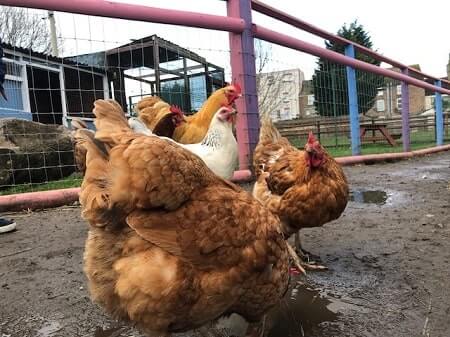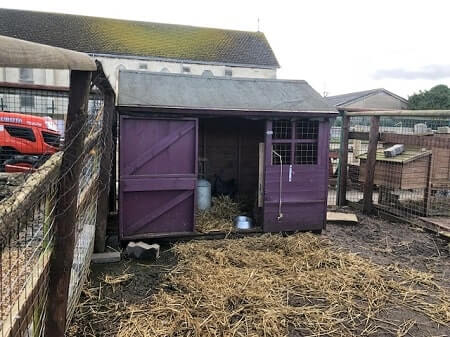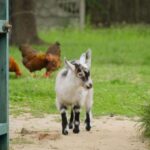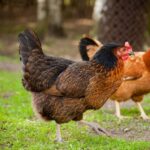There are a number of potential predators we need to keep our eyes and ears open for when raising a backyard flock.
When was the last time you checked what predators that pose a threat to your chickens live in your city, state, or country?
In this article, I’m looking at one of the most cunning and crafty of all the predators; the bobcat.
I’m covering:
- How you can protect your chickens from bobcats
- Do bobcats eat chickens?
- How likely you are to see a bobcat
Plus some interesting information about these large wild cats.
Table of Contents
Do Bobcats Eat Chickens?

Unfortunately, the answer is yes. A bobcat will kill and eat a chicken if they can get their claws and teeth into one.
They are known to be more active between the hours of dusk and dawn. Although they will come out in the day, especially if they’re hungry.
I’ve even read accounts of some bobcats becoming almost “tame” and hanging out around people’s homes in rural areas.
Like domestic cats, bobcats have excellent vision, even at night time. They also have a powerful sense of smell and hearing, so they’ll be aware from a long distance away if you have chickens.
As you can imagine, a chicken - or even several chickens - stand no chance against a bobcat if it is able to get close enough to grab a hold of them.
They have razor-sharp claws and teeth. You can often tell if it was a bobcat that attacked your flock during the night as they leave a lot of claw marks around the neck and shoulders.
They also tend to feed on the shoulder area too as this is where they pin down their prey. It’s not a nice thought, of course, but if you’re experiencing predators attacking your flock you need to find out what animal is responsible.
Then you can start to put the most appropriate defenses in place to stop them.
Related content - Do owls eat chickens?
How Likely Are Your Chickens to Meet a Bobcat?
This all depends on where you live - and if there are bobcats!
According to Grit, bobcats are most commonly found throughout southern Canada, northern Mexico, and most of the U.S.
They go on to say that populations of wild bobcats across the U.S. have actually been increasing over the last 10-20 years too.
So, if you live in the U.S. I’d check with your local authority, even if you don’t think you have bobcats in your area. You might just be surprised, and it’s worth erring on the side of caution.
How to Protect Your Chickens From Bobcats

Bobcats are incredibly cunning and wiley. Just as you would expect from a large wild cat.
They are attracted to raw meat and live prey, and very good at stalking and hunting their prey. They are known to hunt and kill squirrels, birds, possums, and other animals of a similar size in their natural habitat.
They will also venture into a backyard and kill a chicken if the opportunity presents itself.
If you know you have bobcats in your area, you can’t take any chances either during the day or overnight.
They are so quick that you wouldn’t have time to stop them if you spot one approaching your flock, that’s why prevention is the best option. Not waiting until you’ve seen one or had a sighting in your area confirmed.
To be sure a bobcat can’t get your birds, you will have to have them enclosed in a secure run all day. Then locked up securely in a coop overnight.
Simply using a run with high fencing or flimsy roofing will not be enough either. Bobcats can dig under fencing that’s not buried deep enough, and they can scale high fences too.
Just think about how agile a domestic cat is. Now multiply that by at least 2-3 times and you have a bobcat.
I know some backyard flock owners won’t settle for less than electric fencing as they can’t trust regular wire or fencing to keep a determined bobcat out.
You’ll have to access the risk in your area and take the necessary steps to ensure your hens and roosters are as safe as can be.
Having a rooster is also an extra line of defense, too. They’ll crow up a storm if they see or feel the presence of a predator. Although this is unlikely to scare the large kitty away.
Related content - Make sure you’re aware of different chicken noises and what they mean.
In Summary
Bobcats do eat chickens, yes.
They are one of the predators that pose a very serious threat to backyard chickens, along with great horned owls. So, it's our job to make sure our flocks are nice and safe.
My advice is to check with your local authority if it’s known that you have bobcats in your area, even if you’ve never seen or heard of them locally.
If they say there have been rare sightings or there is any risk at all, you should take all the necessary security steps to make sure your chickens are completely safe.
As with any threats from predators, prevention is by far the best course of action.




